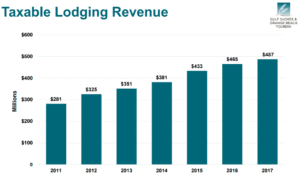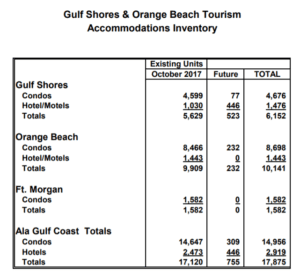Orange Beach, Alabama, located on the Gulf Coast, is a city reliant on a tourism economy led by lodging revenue from vacation rentals. It is difficult to find a working resident whose income is not tied in some way to the booming rental business along Alabama’s Gulf Coast.
However, last week, in a specially-called council meeting on Dec. 15, a six-month moratorium on new vacation rental licenses passed with a 5-0 vote, and went into effect on Dec. 20 at 5 p.m.
Read the entire ordinance here.
According to OBA, “Orange Beach leaders say they will use the moratorium period to draft a new ordinance to further restrict using individual homes for vacation rentals.”
It is the same story in municipalities throughout the US:
- A traveler stays in a vacation rental in a beautiful tourist area.
- The traveler likes the area so much, he/she decides to move there.
- Once the traveler becomes a full-time resident, he/she no longer wants any other travelers there because it is a nuisance to have a new family next door each week.
- He/she complains to the HOA and gets nowhere.
- He/she then complains to the city council members about the “extreme” hardships of noise, trash, and parking.
- City council members listen because the now-full-time resident votes, while non-resident property owners who invested in and support the community don’t get a vote.
- The city council pushes some type of self-punishing regulations to appease a handful of agitated full-time residents.
- Vacation rentals get a whole new set of regulations and restrictions.
- Property rights are infringed upon, and real estate gets harder to sell.
- Revenues to the city suffer, and growth slows.
Rinse and repeat.
Vacation rental industry advocates fight the same battle at the city level time and time again—so often that the Vacation Rental Management Association (VRMA) restructured its management to focus on government relations.
 The reality is that the reported issues—noise, trash, parking, and tax remittance—can easily be addressed without restricting the property rights of homeowners to rent their homes on a short-term basis, and there are numerous examples of how these complaints have been addressed in other popular destinations.
The reality is that the reported issues—noise, trash, parking, and tax remittance—can easily be addressed without restricting the property rights of homeowners to rent their homes on a short-term basis, and there are numerous examples of how these complaints have been addressed in other popular destinations.
The underlying issue, however, that some voting full-time residents don’t like having short-term renters in their neighborhood, is harder to combat.
City council members, officials, and property management companies must find a way to engage full-time residents to let them be heard, address legitimate complaints, understand the underlying reason for the protest, and implement good-neighbor policies.
In Orange Beach, new zoning ordinance proposals will be discussed at the next city council meeting on January 4 at 5:00 p.m. There will be the opportunity for public comment.
“Any changes to the short-term rental ordinance have long reaching effects for the real estate profession,” stated an email from the Baldwin County Association of Realtors. “This has the potential to impact property values, pending and future sales, and the rights of property owners.”
The email also said:
“This is a property rights issue that others believe can better be resolved by increased enforcement through police powers, citations to property owners, or revoking licenses of those rental properties with chronic complaints. Many HOA’s already have restrictions on short term rentals. Better enforcement by HOA’s could be an alternative to government restrictions. There was also a suggestion to deny any future licenses if they are in violation of an established HOA restriction. Currently there are only two types of licenses for rentals; more than 6 months, or less than 6 months. It is contemplated that the council may create a third category that takes into account the increased popularity of AirB&B type rentals. It is yet to be determined what geographical boundaries would be included in a new ordinance. Most of the city council agreed that beach properties south of Hwy 182 would not be treated the same as other areas of the city. But, others argued that some locations on the beach have a more residential nature and should be included.”
“This something that we’ve been working on for over a year, maybe even longer,” Councilwoman Joni Blalock said. “We’ve had multiple citizens come to our chamber as far back as two or three years ago complaining about short-term rentals in residential neighborhoods. Our planning department has had something written for a while trying to truly vet it completely out so we are doing this in the best possible way.”
Realtors and property managers are encouraged to be present at the meeting to voice comments and concerns.




The best way is for the city to draft a mandated lease form that controls occupancy based on bedrooms, controls behavior ie loud noise etcand renters are booted. Let people rent but kick them out if they are in breach of the rental agreement, ie are behaving badly.
The regulation effort has to be based on this constitutional right. Law making bodies has to set not a uniform rule but an equal rule that protects the property rights of homeowners and its neighbors. We have to identify if the chaos in the area is of solely caused by vacation rentals or simply if the existence of them are already been observed. Find measures in which vacation rental business runs in accordance with the regulations set. Other states were able to manage vacation rental business fostering economic growth on those cities. Focusing mainly on its impact to homeowners associations and its neighbors are relatively issues losing the opportunity of vacation rental business to grow. Another great site that helps vacation rental owners find travelers is Rentalo.com — You can add your listing for free and then pay a fee when booked — check details at http://rentalo.com/vacation…